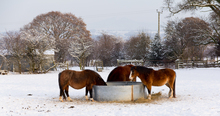Winter can be a challenging time for horse management. Whether your horse lives in the barn or in the pasture, there are some key points to keeping your equine happy and healthy during the colder months.

Ensuring adequate caloric intake of horses
A primary matter to be addressed during cold winter weather is insuring adequate caloric intake since a horse's energy requirement may increase up to 25%.
Pastured horses keep warm by using up the food they eat. This means that in cold weather, any horse has a higher nutritional requirement than in mild weather. Broodmares in the last months of gestation are often kept at pasture, and have extremely high demands for increased nutrition.
High-quality hay and grain should be supplemented to pastured horses in order to maintain good body condition. Because long hair coats and blankets hide the horse’s body, it is important to feel for adequate rib cover.
Round bales are a convenient way to provide hay to horses at pasture, but are associated with a higher risk of botulism toxicity.
Botulism is caused by exposure to Clostridium botulinum, which causes weakness and paralysis, leading to respiratory failure and death. Horses maintained on round bales should be vaccinated against botulism.
Stabled horses have the luxury of getting out of the weather, but have to contend with the dust, ammonia, mold, and other allergens that linger in a closed barn.
Good airflow is just as important in the winter as in the summer. Especially for horses with heaves, it is important for owners to resist the urge to seal the barn up.
Horses are much more tolerant of the cold than humans are, and need the fresh air to maintain a healthy respiratory tract. Other ways of cutting down on barn "air pollution" include feeding clean, high quality hay, wetting the hay, and disposing of any urine-soaked bedding daily.
It is often difficult to get horses to drink adequate amounts of water in the winter, but it is vital to their health. Impaction colic is very common, especially in the winter, and is often related to a decrease in water consumption. Although this type of colic responds well to medical management, several days of intravenous fluids and frequent nasogastric tubing with fluids and laxatives can be required.
Horses are more likely get behind on water consumption if the water is cold, and especially if there is ice in it. Keeping water ice-free, either by removing ice regularly or using heated buckets or other heating devices is key to ensuring an accessible water supply to the herd.
Horses will more readily drink warm water when the weather is cold, and warm water is especially good for horses following exercise.
Soaking the horse’s feed or offering warm soaked bran mashes or beet pulp is a way of sneaking water into his diet. Of course, offering an ample supply of salt/minerals will also stimulate a horse to drink.
Winter horse care demands more organization to maintain sufficient nutrition as temperatures drop. As the weather turns cold, many horses are ridden less and less. Lower temperatures, wind and wet conditions cause a tremendous demand on the horse’s body for heat production.
These factors can cause the horse to lose weight and body condition depending on the severity and duration of the cold season and the amount of energy the horse receives from its feed.
The primary matters that need to be addressed during cold winter weather include insuring adequate nutritional caloric intake, proper hydration, and maintaining an environment that is conducive to good horse health.
Follow these tips to maintain horse health in winter weather:
- Monitor horses carefully for shivering when they are turned out in cold, windy and/or wet weather, whether blanketed or not.
- Maximize indoor ventilation by keeping doors and windows open or using ceiling fans and vents.
- If blanketing, choose blankets that are water repellent, moisture wicking, and well-fitting.
- Consider booster vaccinations for diseases such as influenza, rhinopneumonitis, and strangles.
- Assess body condition score regularly.
- Provide adequate calories. A horse's energy requirements may increase up to 25%.
- Give unlimited access to unfrozen water.
